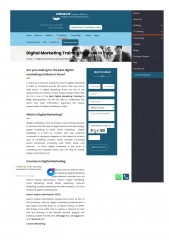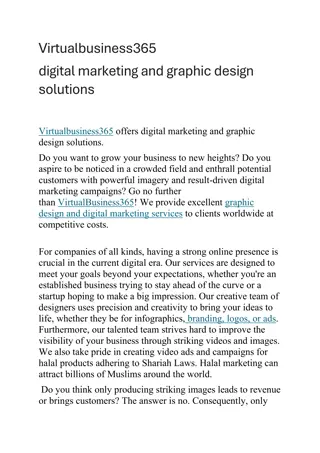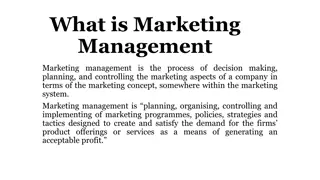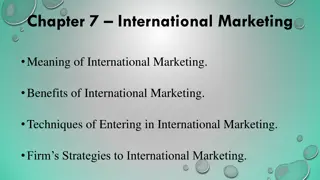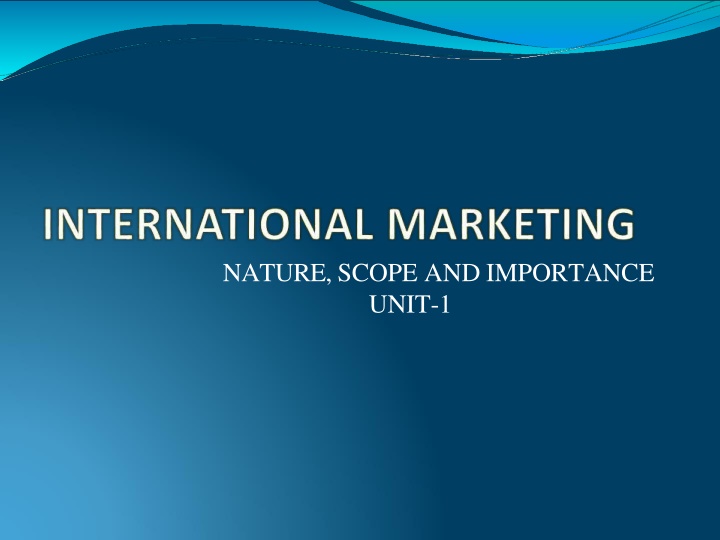
International Marketing: Nature, Scope, and Importance
Explore the meaning of international marketing, its scope, and why it is important, as well as the nature of international marketing. Learn about the challenges, risks, and competition involved, and discover the broad market available. Additionally, understand the scope of international marketing, including imports and exports.
Uploaded on | 190 Views
Download Presentation

Please find below an Image/Link to download the presentation.
The content on the website is provided AS IS for your information and personal use only. It may not be sold, licensed, or shared on other websites without obtaining consent from the author. If you encounter any issues during the download, it is possible that the publisher has removed the file from their server.
You are allowed to download the files provided on this website for personal or commercial use, subject to the condition that they are used lawfully. All files are the property of their respective owners.
The content on the website is provided AS IS for your information and personal use only. It may not be sold, licensed, or shared on other websites without obtaining consent from the author.
E N D
Presentation Transcript
NATURE, SCOPE AND IMPORTANCE UNIT-1
Meaning of International Marketing It to the buying or selling of goods and services beyond the boundaries of a country. When a country crosses its national frontiers to market its products it is indulging in international marketing. In simple words, when two countries exchange the products and services with the motive of business trade, the process is called International Marketing.
Definitions of International Marketing According to Kotler, "Global marketing is concerned with integrating and standardizing marketing actions across a number of geographic markets." According to Cateora, "International marketing is the performance of business activities that direct the flow of goods and services to consumers and users in more than one nation."
According to Cateora and Graham, "International marketing is the performance of business activities designed to plan, price, promote, and direct the flow of a company s goods and services to consumers or users in more than one nation for a profit." According to Terpstra and Sorathy, international marketing consists of finding and satisfying global customer needs better than the competition, both domestic and international and of coordinating marketing activities with in the constraints of the global environment. International marketing is different from domestic marketing not only in scope but also in nature. Following are the nature and scope of international marketing.
Nature of International Marketing 1. Broader market is available Unlike domestic marketing the market is not restricted to national population. Population of other countries can also be targeted in international marketing. 2. Involves at least two set of uncontrollable variables In domestic marketing the marketers have to interact with only one set of uncontrollable variables. In international marketing at least two set of uncontrollable variables are involved or more if the marketing organization deals in more countries.
Requires broader competence Special management skills and broader competence is required in international marketing/business. 3. Competition is intense An international marketing organization has to compete with both the domestic competitors and the international competitors. Hence, the competition is intense in international marketing. 4. Involve high risk and challenges International marketing is prove to various kinds of risk and challenge like political risk, cultural differences, changes in fashion and style of foreign customers, sudden war, changes in government rules and regulations, communication challenges due to language and cultural barriers, etc,. 5.
The Scope of International Marketing International marketing that is also known as global marketing has earned a great scope today. No business can survive in international market until they don t have internal marketing plan. Thanks to globalization, the marketing strategies of today are not limited to stay confined within the borders of a country. Instead, the world is like an open market for marketers and they can enter whichever market they want. In other words, the scope of international marketing has grown wildly than it was in the past. Promoting a product internationally is rising up Indonesia, China, India, Mexico, Korea, Chile, Argentina, and Brazil in the form of new and potential markets. Moreover, increased power of purchasing and ever changing customer taste along with the assistance in gaining the knowledge about these taste has changed the shape of the world altogether. Since the number of potential markets is growing, so it is important for any brand for having complete information about how messy it can get for them out there, if they are not fully aware of how far they can go for promoting their product. That s why we wrote a full-fledged article for fulfilling the purpose of making you understand the limits and freed of international businesses.
Scope of International Marketing 1. Imports Importing products for a brand works the same way like as it does for a whole country. Businesses buy up the products so that they can resale it to potential customer base inland that they have gathered with a lot of hard work and passing through tough times. But most of the times, companies take help from imports for their own use creation and improving their own production line. They do so when they are pretty sure that using the product can let them achieve their objective or can be helpful in putting up a unique solution.
2. Exports Exporting is similar in terms of concept for a brand as it is for a country. Companies export their finalized products to international markets or on to their other franchises in far off markets where they can sell the products to their localities for generating huge revenues. Not just this, even semi-finalized products are exported for getting an extra boost for the brand s treasury. This revenue generated through exports is then used for paying up the costs of imports, covering up the costs of development as well as ripening profits. Both the imports and exports help in expanding the reach of the companies.
3. Contractual Agreements Whenever, business moves out to international level, its scope of international marketing exposes it to greater chances of doing a lot more business. In fact, the fun part starts there when you see your company making contractual agreements with many others. Those agreements can either be in terms of licensing or co- production or even of technical assistance. Licensing then moves further down the road and includes even more agreements in the form of trademarks, patents, secrets of the brand and brand names, too, which those companies are allowed to use only if the fee is paid. Well! The fee part surely scares some of the traders but it s better to give one-time sacrifice and once your business starts running normally, the fee for such licenses can be automatically covered.
4. Joint Venturing Joint Venture is the name of a collaborative association of two brands for a reasonable period of time. This association then gives birth to an even new firm that works individually and pursues goals other than parent companies. This new firm works under the banner of both the venturing brands and the division of profits and losses takes places between both in a certain ratio. Most of the time, joint venture comes into being when a local company is of great interest for an investor out of the game field or sometimes, the case can go totally opposite. This technique is of extreme value to companies are interested in doing business in the countries where outsiders are not allowed to have their owned businesses and thus, raises the scope of international marketing.
5.Contract Manufacturing Contract manufacturing is one of the most used tactics and is pretty awesome as well since it reduced the costs of productions for the companies or better said the company takes off the responsibility of assembling the products, itself. The other company, with which the contract is made, assembles the product and keeps product marketing. This is what a manufacturing contract is called. This process cuts half the both the price and risk while encouraging easy exit at the same time.
6.Fully Owned Manufacturing This aspect of the scope of international marketing comes into play when it is in the best interests of the company to take full control over both the production and promotion in the target markets. For the purpose, the company sets up its own facilities for the creation and assembling the product (if possible). This lets the brand to work for long term interests instead of pursuing short term goals and keeping the quality and prices under their own consideration without having to rely on others. Well! There are many other factors also that would force the company to take charge of everything. Such factors include trade barriers (and that, too, at their maximum extent), governmental policies and cost differences.
7. Strategic Alliances Gaining a long term competitive advantage over the competitors is not an easy task. But at that point, it s important for you to learn that what you can t achieve alone, you can do so by making some friends. It works just like the concept which says that enemy of your enemy can be your friend. It s capabilities of increasing the innovative flow while boosting up the flexibility for making the responses back to the market and that s what makes this thing to be included among the important points of the scope of international marketing.
8.Management Contracts There is yet another point that s describable among the scope of international marketing and that s the existence of management contracts. These contracts are helpful in achieving a skilled labor force for the brand from the brand with comparatively experienced workers. In this way, the company can save itself from greater dangers easily with that skill-filled package supplied by the supplier as the par contract.
DIFFERENCE BETWEEN DOMESTIC AND INTERNATIONAL MARKETING MEANING Domestic Marketing means when business takes place within the country but International Marketing means when marketing of goods and services take place outside the boundaries of a country.
Domestic marketing REQUIREMENT: Internal Marketing is essential for the requirement of different states and cities of a country LANGUAGE PROBLEM: Language problem does not arise in Internal marketing. CURRENCY: Same currency is followed in internal marketing International Marketing REQUIREMENT: International Marketing is necessary for country s economical, technical development and cultural exchange. LANGUAGE PROBLEM: It arises in case of international marketing. CURRENCY: International marketing exchange rate is to be considered.
GOVT. INTERFERENCE: Govt. interference is very less in internal marketing. MARKET RESEARCH: Market research work is very easy in case of internal marketing GOVT. INTERFERENCE: Govt. plays a very imp roll in case of international marketing. MARKET RESEARCH: Market research work is very tougher in case of international marketing in comparison to internal marketing.
NATURE OF INTERNATIONAL MARKETING PROTECTIVE NATURE International Marketing is protective by nature. There are some restrictions in IM which protect domestic industries from foreign competition. COMPETITIVE MARKET In IM the exporters have to face three tier competition, i.e. local manufacturers, (2) from manufacturers of own country, and (3) from manufacturers of other foreign countries. (1) from
MORE RISK Because of the longer time period involved due to longer time in transit and longer credit period involved. DIFFERENT LEGAL SYSTEMS Each country has its own legal system and often the legal systems operating in different countries differ from each other.
NATURE OF INTERNATIONAL MARKETING DIFFERENT MONETARY SYSTEMS Monetary system and exchange value of each country's currency are different from that of the other. CREDIT ORIENTED Developing countries prefer to buy goods from those countries which offer liberal credit facilities i.e. period of payment should be long and interest charged should be low. CONTROLLING NATURE Developed countries like USA and Japan have dominating position in IM because of the use of advanced technology. POLITICAL NATURE IM is political in nature. There is virtually no trade between those countries which are not having cordial relations.
FACTORS INFLUENCING INTERNATIONAL MARKETING INTERNAL FACTORS Factors existing within the marketing firm are called internal factors. These are the controllable factors which can be modified according to the environment. EXTERNAL FACTORS The external factors which influence the International marketing decisions of a business organization can be Economic Environment Social and Cultural Environment Political Environment Legal Environment Physical Environment Technological Environment Business Environment. 1. 2. 3. 4. 5. 6. 7.
IMPORTANCE OF INTERNATIONAL MARKETING Domestic Market Constraints (a)Small domestic market (b)Due to Recession (c)Sale at Saturation point (d)Growth in international market (e)Change in Demand in Domestic Market (f)Economies of Large Scale Production Govt. policies and regulations Increased productivity Counter competition Relative profitability Reducing Business Risk Control Inflation and Price Rise Product Obsolescence 1. 2. 3. 4. 5. 6. 7. 8.
OTHER FACTORS OF INFLUENCING INTERNATIONAL MARKETING- 9. Unequal Distribution of Natural Resources. 10. Advantages of Specialization 11. Technological development 12. To Create Research Opportunity 13. Helps in Political Peace 14. Economic Development of a Country (a) Rapid economic growth (b) Profitable use of natural resources (c) Increase in Employment Opportunities (d) Role of Exports in National Income (e)Increase in standard of living (f) International Collaboration (g) Closer Cultural Relations
Key Issues in International Marketing 1. Tariff Barriers: Tariff barriers indicate taxes and duties imposed on imports. Marketers of guest countries find it difficult to earn adequate profits while selling products in the host countries. Sometimes, to prevent foreign products and/or promote domestic products, strategically tariff policies are formulated that restricts international marketing activities. Frequent change in tariff rates and variable tariff rates for various categories of products create uncertainty for traders to trade internationally. Antidumping duties levied on imports and defensive strategies create difficulty for exporters.
Key Issues in International Marketing 2. Administrative Policies: Bureaucratic rules or administrative procedures both in guest countries and host countries make international (export and/or import) marketing harder. Some countries have too lengthy formalities that exporters and importers have to clear. Unjust dealings to get the formalities/ matters cleared create many problems to some international players. International marketers have to accustom with legal formalities of several courtiers where they wants to operate.
Key Issues in International Marketing 3. Considerable Diversities: Different countries have their own unique civilization and culture. They pose special problems for international marketers. Global customers exhibit considerable cultural and social diversities in term of needs, preferences, habits, languages, expectations, buying capacities, buying and consumption patterns, and so forth. Social and personal characteristics of customers of different nationalities are real challenges to understand and incorporate. Compared to local and domestic markets, it is more difficult to understand behaviour of customers of other countries.
Key Issues in International Marketing 4. Political Instability or Environment: Different political systems (democracy or dictatorship), different economics systems (market economy, command economy, and mixed economy), and political instability are some of real challenges that international markers have to face. Political atmosphere in different courtiers offer opportunities or pose challenges to international marketers. Governments in different nations have their priorities, philosophies, and approaches to the international trades. They may adopt restrictive (protectionist) or liberal approach to international business operations. Especially, political approaches of dominant nations have more influence in international marketing activities.
Key Issues in International Marketing 5. Place Constraints (Diverse G ographie): Trade in foreign countries of far distance itself practically difficult. In case of perishable products, it is a real challenge. Exporting and importing products via sea route and making arrangements for effective selling involves more time as well risks. Segmenting and selecting international markets require the marketers to be more careful.
Key Issues in International Marketing 6. Variations in Exchange Rates: Every nation has its currency that is to be exchanged with currencies of other nations. Currencies are traded every day and rates are subject to change. Indian Rupee, European Dollar, US Dollar, Japanese Yen, etc., are appreciated or discounted at national and international markets against other currencies. In case of extraordinary and unexpected moves (ups and downs) in currency/exchange rates between two courtiers create serious settlement problems.
Key Issues in International Marketing 7. Norms and Ethics Challenges: Ethics refers to moral principles, standards, and norms of conduct governing individual and firm s behaviour. They are deeply reflected in formal laws and regulations. In different parts of the world, different codes of conduct are specified that every international business player has to observe. However, globalization process has emphasized some common ethics worldwide. Corruption is another issue relating to business ethics.
Key Issues in International Marketing 8. Terrorism and Racism: Terrorism is a global issue, a worldwide problem. People of the world are living under constant fear of terrorists attracts anywhere in the world. To trade internationally is not economically risky, but there is the threat to life. Racism also restricts international trade activities.
Key Issues in International Marketing 9. Other Difficulties: Besides these problems, there are many obstacles in international markets, such as: a. Changing ecological environment and global warming b. Difference in weathers and natural climates c. Inappropriate or inadequate role of international agencies supporting and regulating international trades d. Natural and man-made calamities e. Difference in currencies, weights, standards, measures, and marketing methods f. Protectionist approach of some countries g. Economic crisis across the globe.





